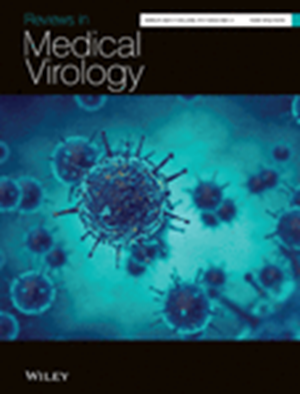病毒引起的宿主细胞代谢改变
IF 9
2区 医学
Q1 VIROLOGY
引用次数: 0
摘要
病毒改变宿主细胞的新陈代谢,以产生传染性粒子,并为复制和繁殖创造最佳条件。宿主细胞的许多途径都发生了改变,以确保获得生物分子和足够的能量。过去十年间进行的代谢组学研究发现,真核细胞病毒会大规模改变宿主细胞的新陈代谢。改变糖酵解、脂肪酸合成和谷氨酰胺酵解等途径可为病毒繁殖提供潜在能量。因此,几乎每种病毒都有独特的代谢特征,病毒生命周期与各个代谢过程之间的关系也各不相同。在病毒诱导宿主细胞新陈代谢重编程方面有大量研究,目前正通过使用不同的候选疫苗和抗病毒药物物质等多种方法进行研究。本综述概述了病毒对不同代谢途径的干扰,改进对这一领域的监测将为更有效的抗病毒疗法和对抗病毒诱导的肿瘤发生开辟新的途径。本文章由计算机程序翻译,如有差异,请以英文原文为准。
Virus‐induced host cell metabolic alteration
Viruses change the host cell metabolism to produce infectious particles and create optimal conditions for replication and reproduction. Numerous host cell pathways have been modified to ensure available biomolecules and sufficient energy. Metabolomics studies conducted over the past decade have revealed that eukaryotic viruses alter the metabolism of their host cells on a large scale. Modifying pathways like glycolysis, fatty acid synthesis and glutaminolysis could provide potential energy for virus multiplication. Thus, almost every virus has a unique metabolic signature and a different relationship between the viral life cycle and the individual metabolic processes. There are enormous research in virus induced metabolic reprogramming of host cells that is being conducted through numerous approaches using different vaccine candidates and antiviral drug substances. This review provides an overview of viral interference to different metabolic pathways and improved monitoring in this area will open up new ways for more effective antiviral therapies and combating virus induced oncogenesis.
求助全文
通过发布文献求助,成功后即可免费获取论文全文。
去求助
来源期刊

Reviews in Medical Virology
医学-病毒学
CiteScore
21.40
自引率
0.90%
发文量
88
期刊介绍:
Reviews in Medical Virology aims to provide articles reviewing conceptual or technological advances in diverse areas of virology. The journal covers topics such as molecular biology, cell biology, replication, pathogenesis, immunology, immunization, epidemiology, diagnosis, treatment of viruses of medical importance, and COVID-19 research. The journal has an Impact Factor of 6.989 for the year 2020.
The readership of the journal includes clinicians, virologists, medical microbiologists, molecular biologists, infectious disease specialists, and immunologists. Reviews in Medical Virology is indexed and abstracted in databases such as CABI, Abstracts in Anthropology, ProQuest, Embase, MEDLINE/PubMed, ProQuest Central K-494, SCOPUS, and Web of Science et,al.
 求助内容:
求助内容: 应助结果提醒方式:
应助结果提醒方式:


